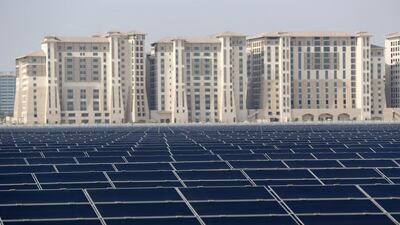Quercus Investment Partners, a London-based investment adviser, plans to open an office in Dubai to tap growing potential for investment in renewables in the Middle East as countries designate billions of dollars for clean energy.
Quercus, which specialises in renewable energy projects, expects to open an office by the summer, probably within the free zone of Dubai Multi-Commodities Centre (DMCC). Dubai will be one of many branches that will help Quercus to double in size, in revenue and staff, over the next two years.
“We wanted to have a presence in Dubai on the investment and fundraising side and also to liaise with Far East investors – it’s a very convenient crossroad,” said Diego Biasi, Quercus’ chief executive.
The GCC is making a strong show for renewables. The UAE, which has more than 1 gigawatt (GW) of solar projects being tendered, is spending Dh600 billion over the next 33 years to integrate renewable, nuclear and clean fossil energy as part of its 2050 energy plan.
Saudi Arabia plans to spend up to US$50bn for 9.5GW of renewables by 2023, while Qatar, Kuwait and Oman have their own projects.
Quercus will look for investments for utility-scale renewable projects, more than 100 megawatts, that will provide a double-digit return, Mr Biasi said, without providing the target size for investments.
Attention is turning to emerging markets such as the Middle East for renewable energy investment. Europe was the first to invest heavily in the sector with major cash flows starting in 2005. The European countries at times made up 40 to 50 per cent of global renewable energy investments until being surpassed by China in 2013, according to the European Environment Agency.
Now the market has moved into a new phase of more mergers and acquisitions of operating assets in Europe while other areas are just getting started with development, according to Quercus.
The region’s new markets are behaving as Europe did a decade ago and that is why the infrastructure investor is opening an office in Dubai. “We think there’s a big amount of opportunities in the region, not only in the UAE but in the neighbouring countries and regions – we’re talking about several hundreds of millions of euros in the next five years,” said Mr Biasi.
Quercus has built a €300 million (Dh1.18bn) portfolio that includes 22 utility-scale plants throughout Europe and structuring debt facilities for seven years. And at the end of last year, the company finalised the largest bond issued in Italy, €125m, to finance solar plants. Mr Biasi said that the green bond was nearly three times oversubscribed.
Green bonds, based on principles set by the International Capital Market Association, fund projects that benefit the environment. Mr Biasi said this type of financing would be used after a project has been completed to refinance debt. The Middle East has yet to see a green bond after the National Bank of Abu Dhabi put on hold plans for issuance in September.
Mr Biasi said green bonds could come into play in the region rather than tapping banks for loans, although it depended on the appetite for the Middle East over risks and renewables. “It takes time to structure a green bond, it’s a sophisticated product requiring advanced skills,” he said.
lgraves@thenational.ae
Follow The National's Business section on Twitter

